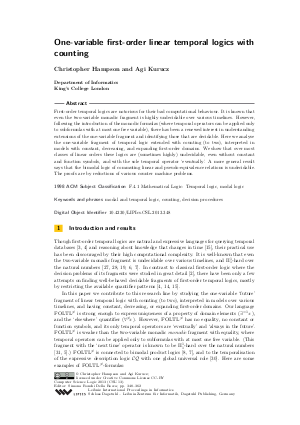One-variable first-order linear temporal logics with counting
Authors Christopher Hampson, Agi Kurucz
-
Part of:
Volume:
Computer Science Logic 2013 (CSL 2013)
Part of: Series: Leibniz International Proceedings in Informatics (LIPIcs)
Part of: Conference: Computer Science Logic (CSL) - License:
 Creative Commons Attribution 3.0 Unported license
Creative Commons Attribution 3.0 Unported license
- Publication Date: 2013-09-02
File

PDF
LIPIcs.CSL.2013.348.pdf
- Filesize: 0.51 MB
- 15 pages
Document Identifiers
Subject Classification
Keywords
- modal and temporal logic
- counting
- decision procedures
Metrics
- Access Statistics
-
Total Accesses (updated on a weekly basis)
0Document
0Metadata
Abstract
First-order temporal logics are notorious for their bad computational behaviour. It is known that even the two-variable monadic fragment is highly undecidable over various timelines. However, following the introduction of the monodic formulas (where temporal operators can be applied only to subformulas with at most one free variable), there has been a renewed interest in understanding extensions of the one-variable fragment and identifying those that are decidable. Here we analyse the one-variable fragment of temporal logic extended with counting (to two), interpreted in models with constant, decreasing, and expanding first-order domains. We show that over most classes of linear orders these logics are (sometimes highly) undecidable, even without constant and function symbols, and with the sole temporal operator 'eventually'. A more general result says that the bimodal logic of commuting linear and pseudo-equivalence relations is undecidable. The proofs are by reductions of various counter machine problems.
Cite As Get BibTex
Christopher Hampson and Agi Kurucz. One-variable first-order linear temporal logics with counting. In Computer Science Logic 2013 (CSL 2013). Leibniz International Proceedings in Informatics (LIPIcs), Volume 23, pp. 348-362, Schloss Dagstuhl – Leibniz-Zentrum für Informatik (2013)
https://doi.org/10.4230/LIPIcs.CSL.2013.348
BibTex
@InProceedings{hampson_et_al:LIPIcs.CSL.2013.348,
author = {Hampson, Christopher and Kurucz, Agi},
title = {{One-variable first-order linear temporal logics with counting}},
booktitle = {Computer Science Logic 2013 (CSL 2013)},
pages = {348--362},
series = {Leibniz International Proceedings in Informatics (LIPIcs)},
ISBN = {978-3-939897-60-6},
ISSN = {1868-8969},
year = {2013},
volume = {23},
editor = {Ronchi Della Rocca, Simona},
publisher = {Schloss Dagstuhl -- Leibniz-Zentrum f{\"u}r Informatik},
address = {Dagstuhl, Germany},
URL = {https://drops.dagstuhl.de/entities/document/10.4230/LIPIcs.CSL.2013.348},
URN = {urn:nbn:de:0030-drops-42072},
doi = {10.4230/LIPIcs.CSL.2013.348},
annote = {Keywords: modal and temporal logic, counting, decision procedures}
}
